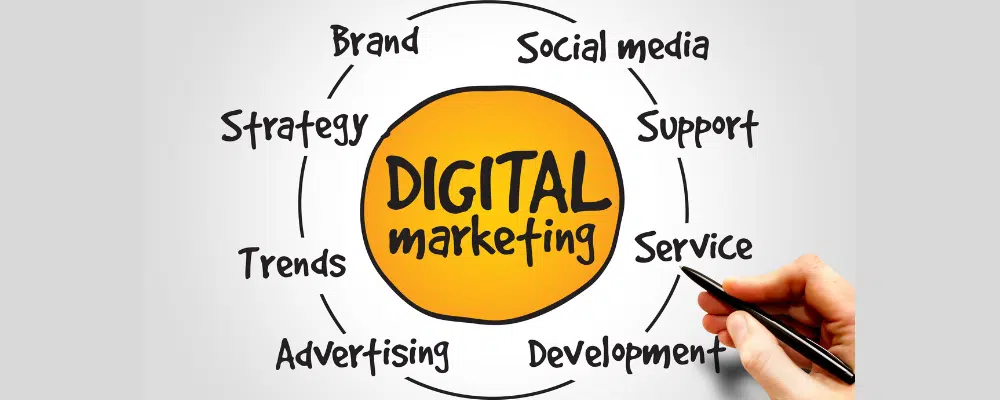Digital marketing has become a vital component for the success of HVAC companies in today’s highly competitive business environment. With the increasing reliance on the internet and digital technologies, having an effective digital marketing plan is essential for reaching and engaging with customers in the HVAC industry.
Digital marketing provides a multitude of benefits for HVAC companies, playing a crucial part in their comprehensive marketing strategy. To begin with, it enables them to broaden their scope and exposure beyond conventional marketing avenues. Through the utilization of online platforms such as search engines, social media, and industry-specific websites, HVAC companies can efficiently connect with potential customers who actively seek their services. This empowers them to access a wider market and enhance their prospects of capturing new clientele.
Digital marketing helps HVAC companies build brand awareness and establish a strong online presence. Through consistent messaging, compelling content, and strategic online campaigns, these companies can enhance their brand recognition and credibility among their target audience. A well-executed digital marketing plan ensures that the HVAC company is visible to potential customers when they are researching or seeking solutions related to heating, ventilation, and air conditioning services.
Flexibility and Adaptability in Digital Marketing
Implementing an effective digital marketing plan has several advantages for HVAC companies. It offers cost-effectiveness by precisely targeting desired customer segments, maximizing ad spend efficiency, and increasing return on investment. Another benefit is accurate measurement and tracking of results. Real-time data and analytics enable monitoring campaign performance, optimizing strategies, and making data-driven decisions for continual improvement.

Keeping up with Google algorithm changes is important for small businesses to maintain their digital marketing success. An effective digital marketing plan enhances customer targeting capabilities. Personalized and relevant messages, delivered through targeted social media ads, email campaigns, and tailored content, foster stronger connections and increase conversion rates. Digital marketing also provides flexibility and adaptability. HVAC companies can quickly adjust strategies based on market trends, customer feedback, and campaign performance, ensuring relevance and effectiveness in reaching the target audience. By staying informed about the latest Google algorithm changes and implementing appropriate adjustments, small businesses can stay ahead of the curve and maintain their online visibility and success.
Gain Insights into Your Target Market
In order to create an effective digital marketing plan, it is essential to have a clear understanding of your target audience. This involves two important steps: defining your target audience and conducting market research and analysis.
Defining your target audience involves identifying the specific group of people who are most likely to be interested in your HVAC company’s products or services. This includes factors such as demographics (age, gender, location, income), psychographics (interests, behaviors, values), and any other relevant characteristics that define your ideal customers. Having a clear understanding of your target audience allows you to customize your marketing strategies, ensuring effective communication and engagement with them.

Conducting market research and analysis is also important for gaining insights into your target audience and the overall market. This involves gathering information about your audience’s preferences, needs, and pain points, as well as studying your competitors and industry trends. Market research methods can include surveys, interviews, data analysis, and competitor analysis. Understanding the ever-changing market dynamics and customer behavior empowers you to craft a digital marketing plan that seamlessly aligns with your audience’s requirements, enabling your brand to effortlessly distinguish itself from competitors.
Set Clear Marketing Goals
Setting clear marketing goals is essential for guiding your digital campaigns towards success. By defining specific, measurable, achievable, relevant, and time-bound (SMART) objectives, you provide a clear direction and purpose to your marketing efforts.
- To set effective marketing goals, start by identifying what you aim to achieve. Whether it’s increasing brand awareness, driving website traffic, generating leads, or boosting sales, each goal should be specific and well-defined.
- Make sure your goals are measurable. This means having quantifiable metrics in place to track your progress and determine whether you have achieved the desired outcomes. It could be the number of website visits, the percentage increase in social media followers, or the revenue generated from a specific campaign.
- Your goals should be achievable, considering your available resources, budget, and capabilities. Setting unrealistic targets can lead to frustration and demotivation. Instead, focus on setting goals that stretch your potential but are still within reach.
- Relevance is another important aspect of goal setting. Your objectives should align with your overall marketing strategy and business objectives. They should contribute to the growth and success of your organization in a meaningful way.
- Make sure your goals are time-bound. Set specific deadlines or milestones to create a sense of urgency and ensure that progress is consistently tracked. This helps maintain accountability and keeps your team focused on achieving the desired results within the specified timeframe.

Competitive Analysis
Conducting a thorough competitive analysis within the HVAC industry is crucial for understanding your position in the market and identifying opportunities to differentiate your company effectively. By closely examining your competitors’ strengths, weaknesses, strategies, and market presence, you can gain valuable insights to inform your own business approach.
To begin the process, compile a list of your primary HVAC industry competitors. Research their offerings, target markets, pricing models, and overall market share. Evaluate their strengths and weaknesses in terms of product quality, customer service, brand reputation, and innovation. Identify areas where your competitors excel and analyze how they communicate their unique value propositions to customers. This analysis will help you recognize potential gaps or areas of improvement in your own business.
Differentiating your company from competitors is vital for creating a competitive advantage. Determine what sets your HVAC company apart and highlight these distinctive features. It could be exceptional customer service, specialized expertise, advanced technology, eco-friendly practices, or a unique service offering.
By emphasizing your unique selling points, you can effectively position your company as a preferred choice for customers. Craft compelling messaging and marketing strategies that highlight the benefits and value your business brings, clearly communicating why customers should choose your services over competitors.

Consider conducting a SWOT (Strengths, Weaknesses, Opportunities, Threats) analysis to assess your internal strengths and weaknesses as well as external market opportunities and threats. This analysis will provide a comprehensive overview of your business landscape, guiding you in making informed decisions and capitalizing on your competitive advantages.
Regularly monitoring and updating your competitive analysis will enable you to stay ahead of industry trends, identify emerging competitors, and adapt your strategies accordingly. Remember, effective differentiation coupled with a deep understanding of your competitors will contribute to your long-term success in the HVAC industry.
Build an Online Presence
Establishing a strong online presence is essential in today’s digital world. It begins with developing a professional website and optimizing it for search engines (SEO) to enhance visibility and attract relevant traffic. By effectively implementing these strategies, you can effectively engage with your target audience and drive business growth.
Creating a professional website forms the bedrock of your online presence. It serves as a reflection of your brand identity, an avenue to exhibit your offerings, and a platform that delivers a smooth and intuitive user experience. It is vital to prioritize visually captivating website design that facilitates effortless navigation and optimization across various devices, encompassing desktop and mobile interfaces.
Focus on creating compelling and informative content that addresses the needs and interests of your target audience. High-quality content not only engages visitors but also helps improve your website’s search engine rankings. Regularly update your website with fresh, relevant content such as blog posts, articles, or videos to keep visitors coming back and establish your expertise in the industry.

Optimizing for Search Engines (SEO)
Optimizing your website for search engines (SEO) is important to increase its visibility and organic traffic. Start by conducting keyword research to identify the terms and phrases your target audience uses when searching for products or services similar to yours. Incorporate these keywords naturally throughout your website’s content, including headings, page titles, meta descriptions, and body text.
Apart from incorporating relevant keywords, it is important to prioritize other essential SEO factors to enhance your website’s performance. These factors include optimizing your website’s loading speed, enhancing its mobile-friendliness, and utilizing descriptive URLs. Building valuable backlinks from reputable websites and leveraging social media platforms to share your content can also significantly elevate your website’s SEO effectiveness.
Regularly monitor your website’s performance using web analytics tools to gain insights into visitor behavior, popular pages, and conversion rates. This data can help you make data-driven decisions to further enhance your online presence and improve user experience.
Remember, building an online presence is an ongoing process. Continuously refine and update your website, create valuable content, and adapt your SEO strategies to stay relevant and competitive in the digital landscape. Through these strategies, you can successfully captivate your target audience, generate organic traffic, and cultivate the growth of your business.
Social Media Marketing
Achieving success in social media marketing relies on the careful selection of relevant platforms and the development of a clearly defined content strategy. These two elements play a pivotal role in effectively engaging your target audience and attaining your marketing objectives.
Start by choosing relevant social media platforms that align with your target audience and business objectives. Research and analyze the demographics, user behavior, and engagement levels on different platforms to determine which ones are most suitable for reaching your desired audience. For example, if your target audience consists of young professionals, platforms like LinkedIn or Instagram might be more effective than Facebook.
After pinpointing the appropriate social media platforms, it becomes imperative to construct a comprehensive content strategy. Start by precisely defining your goals and objectives for social media marketing. Whether your aim is to enhance brand awareness, boost website traffic, or generate leads, having a well-defined direction will serve as a guiding force for your content creation endeavors.

Next, consider the preferences and interests of your target audience. Create content that resonates with them, addresses their pain points, and provides value. This can include a mix of informative articles, engaging visuals, videos, polls, contests, or behind-the-scenes glimpses of your business.
Consistency is key in social media marketing. Develop a content calendar and establish a regular posting schedule to maintain a steady presence and keep your audience engaged. Plan ahead and ensure your content is diverse, compelling, and tailored to each platform’s unique characteristics and audience preferences.
Remember to actively engage with your audience by responding to comments, messages, and mentions. Encourage dialogue and foster a sense of community by initiating discussions, asking questions, and actively participating in relevant conversations. Keep track of your social media metrics and analyze the performance of your content. Measure key metrics such as reach, engagement, click-through rates, and conversions to evaluate the effectiveness of your social media efforts. Use this data to refine your strategy, optimize your content, and drive continuous improvement.
Pay-Per-Click (PPC) Advertising
Gaining a firm grasp of the fundamentals of PPC advertising and developing impactful PPC ad campaigns are essential in order to optimize your online visibility, attract relevant traffic, and successfully accomplish your advertising objectives.
PPC advertising involves placing targeted ads on search engines or other platforms, and you only pay when someone clicks on your ad. To create successful PPC campaigns, start by conducting thorough keyword research. Identify relevant keywords and phrases that align with your products, services, or target audience’s search intent. Next, craft compelling ad copy that highlights your unique selling points and encourages users to click. Ensure your ads are concise, engaging, and tailored to resonate with your target audience. Effective ad copy should also include a strong call-to-action (CTA) that prompts users to take the desired action, such as making a purchase or filling out a form.

Optimizing landing pages is also important for PPC advertising. Design landing pages that align with your ad content, offer relevant information, and provide a seamless user experience. Ensure that your landing pages have clear conversion paths and compelling offers to encourage visitors to take the desired action.
Ongoing monitoring and optimization are essential for successful PPC campaigns. Regularly review and analyze your campaign performance, including click-through rates (CTR), conversion rates, and return on investment (ROI). Use this data to identify underperforming keywords or ads and make data-driven adjustments to improve campaign effectiveness.
Take advantage of the targeting capabilities offered by the advertising platform to effectively reach your intended audience. This can involve targeting based on demographics, geographical location, or specific interests. To maximize your chances of capturing qualified leads, targeting your ads towards the most relevant audience segments is crucial. Finally, consider implementing A/B testing to experiment with different ad variations, landing pages, or targeting strategies. Test different elements such as headlines, ad formats, or CTA buttons to identify the most effective combinations and continually refine your campaigns for optimal performance.
Create an Effective Pay-Per-Call Campaign for Your HVAC Business
Creating an effective digital marketing plan for your HVAC company involves various strategies, and one key aspect is building a successful pay-per-call campaign. With a pay-per-call campaign tailored specifically for your HVAC business, you can drive targeted leads and maximize your marketing ROI. Start by conducting thorough keyword research to identify relevant terms and phrases that potential customers might use when seeking HVAC services. Craft compelling ad copy that highlights the benefits of your services and includes a strong call-to-action. Optimize your landing pages to provide a seamless user experience and make it easy for visitors to contact your company directly.
Content Marketing
Content Marketing is a powerful strategy that focuses on creating and distributing valuable content to attract and engage a target audience. By consistently producing high-quality and relevant content, businesses can establish themselves as industry leaders, build brand awareness, and ultimately drive customer engagement and conversions.
One of the key aspects of content marketing is creating valuable content. This involves developing informative, entertaining, and educational materials that resonate with the target audience. Businesses can establish trust and credibility with their audience by addressing their pain points, answering their questions, and providing valuable insights. Valuable content helps position the brand as an authority in the industry, leading to increased brand loyalty and customer retention.
Utilizing blogs and guest posts is another impactful tactic in content marketing. Blogs provide a platform for businesses to regularly share valuable content with their audience. They can cover a wide range of topics related to the industry, products, services, or even provide helpful tips and tutorials. Consistently publishing blog posts allows businesses to drive organic traffic to their website, boost search engine rankings, and position themselves as a reliable source of information.
Guest posts offer an opportunity to reach a broader audience by collaborating with other industry influencers or popular websites. By contributing valuable content to these platforms, businesses can tap into a new pool of potential customers who may not have been aware of their brand before. Guest posts also help build backlinks to the business’s website, which can boost its search engine visibility and credibility.
Email Marketing
Email Marketing is a highly effective digital marketing strategy that involves sending targeted messages to a specific audience via email. It allows businesses to connect directly with their customers, nurture leads, promote products or services, and build strong relationships. Two key elements of successful email marketing are building an email list and designing engaging email campaigns.

Building an email list is the foundation of any email marketing campaign. It involves gathering email addresses from individuals who have expressed interest in your business, products, or content. This can be done through various methods such as offering valuable content in exchange for email subscriptions, providing exclusive discounts or promotions, or through lead generation forms on your website. By continuously growing your email list with quality leads, you have a valuable asset that allows you to directly reach out to potential and existing customers. Here are a few tips you need to consider:
- Creating visually appealing and compelling email templates that reflect your brand’s identity.
- Personalizing the content and offers based on the preferences and behaviors of your audience.
- Dividing your email list into different groups based on specific criteria (e.g., demographics, purchase history).
- Sending targeted messages to each segment, delivering relevant and valuable content to increase engagement and conversion.
- Crafting concise, informative, and engaging email content that motivates recipients to take action.
- Including a clear call-to-action that directs recipients towards desired actions, such as making a purchase or downloading a resource.
- Monitoring important metrics like open rates, click-through rates, and conversion rates.
- Gaining insights into audience preferences and behaviors to make data-driven decisions and optimize future campaigns.
Email marketing offers businesses the opportunity to design captivating campaigns, personalize content, segment their audience, and track performance. Implementing these strategies empowers businesses to effectively engage their email subscribers, drive conversions, and continuously enhance their email marketing efforts.
Monitoring and Analytics
Monitoring and Analytics play an important role in the success of any business’s marketing efforts. Tracking key metrics and analyzing data provides businesses with valuable insights into their performance, customer behavior, and the overall effectiveness of their marketing strategies. This enables informed decision-making and the ability to optimize campaigns for better results.
Tracking key metrics and analytics involves monitoring various performance indicators to assess the success of marketing initiatives. These metrics can include website traffic, conversion rates, click-through rates, engagement rates, social media followers, and many more. Consistently monitoring these metrics allows businesses to identify trends, pinpoint areas for improvement, and make data-driven decisions to enhance their marketing efforts.

Utilizing data for decision-making is a fundamental aspect of effective marketing. By collecting and analyzing data, businesses can gain a deeper understanding of their target audience, their preferences, and their behavior. This data can help in identifying the most effective marketing channels, determining the optimal timing for campaigns, and refining targeting strategies. Data analysis can uncover patterns or trends that may be hidden, enabling businesses to adjust their tactics accordingly and stay ahead of the competition.
Budgeting and Resource Allocation
Properly allocating resources and determining an effective marketing budget allows businesses to optimize their marketing efforts, achieve their goals, and maximize their return on investment. Allocating resources for digital marketing involves strategically distributing available resources, such as time, money, and manpower, to different marketing channels and initiatives. This requires assessing the strengths and weaknesses of each channel and aligning them with the business’s objectives and target audience.
Determining an effective marketing budget involves careful consideration of various factors. It requires analyzing historical data, market trends, and business goals to arrive at a budget that aligns with the desired outcomes. A well-defined marketing budget allows businesses to plan and execute their campaigns efficiently, ensuring that they have the necessary resources to achieve their marketing objectives.
When determining a marketing budget, businesses should consider both the short-term and long-term goals. Short-term goals may include specific campaigns or initiatives, while long-term goals may involve building brand awareness, customer loyalty, or market expansion. Effectively allocating resources allows businesses to strike a balance between achieving immediate results and fostering long-term growth.

It’s important to regularly review and adjust the marketing budget based on the performance and outcomes of different campaigns. Analyzing the return on investment (ROI) and cost-effectiveness of various marketing initiatives allows businesses to refine their resource allocation strategy. Plus, businesses should consider the evolving nature of the digital landscape. New marketing channels, technologies, and trends emerge regularly, and allocating resources to explore and test these opportunities can be beneficial. Being adaptable and open to allocating resources to innovative strategies allows businesses to stay ahead of the curve and leverage new opportunities for growth.
Conclusion
Developing an effective digital marketing plan for your HVAC company is essential for staying competitive in today’s digital era. With a well-executed digital marketing plan, you can enhance brand awareness, generate quality leads, and drive business growth in the ever-evolving digital landscape.
HVAC companies can enjoy numerous long-term benefits by prioritizing growth and implementing effective strategies. These benefits include building a strong brand reputation, achieving sustainable business growth, fostering customer loyalty, gaining a competitive edge, adapting to industry changes, and improving profitability. With a focus on these long-term goals, HVAC companies can establish a solid foundation for success in the dynamic market, guaranteeing sustained prosperity and a prominent position within the industry.




